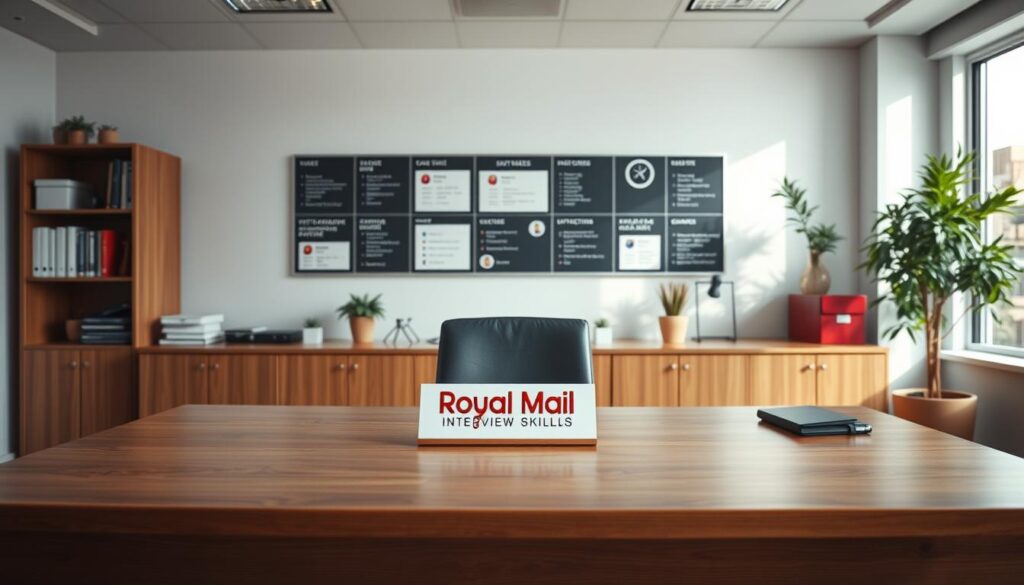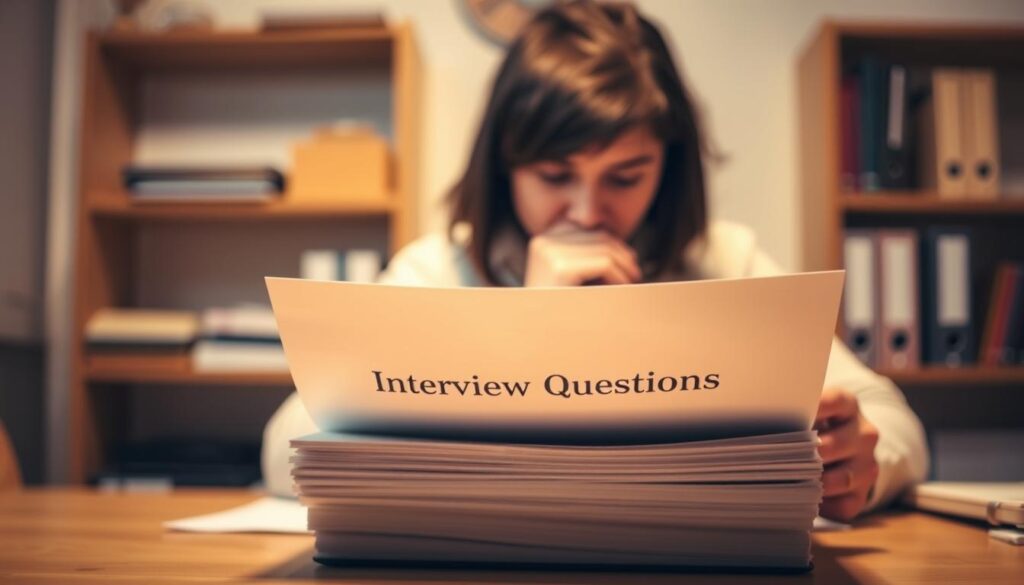Are you ready to make your Royal Mail job interview a success? It’s not just about being nervous. You need to prepare well and know what the interviewers want.
Royal Mail is changing fast. It’s moving from just delivering letters to being a big player in parcel and logistics. To do well, you must show you can help them grow.
This guide will help you get ready for your Royal Mail interview. You’ll learn how to do well, whether you’re applying for a postal job or a graduate program. You’ll get tips to make your interview better and increase your chances of getting the job.
Key Takeaways
- Understand Royal Mail’s current business transformation
- Prepare answers to behavioral questions
- Learn about the company’s values and services
- Practice talking about your skills and experiences
- Work on your body language and confidence
Understanding the Royal Mail Interview Process
Going through the Royal Mail hiring process can be tough. You need to know each step to do well. They look for the best people by checking you in many ways.
The hiring process at Royal Mail looks for people with the right skills and values. You’ll face many tests to show your skills and fit with the company.
Key Stages in the Hiring Procedure
Your journey at the royal mail assessment centre will have key steps:
- Online application submission
- Initial screening of qualifications
- Psychometric testing
- Assessment center evaluation
- Final interview
Common Psychometric Tests
Royal Mail uses special tests to see if you’re a good fit. These tests are made by Korn Ferry. They include:
| Test Type | Skills Assessed | Duration |
|---|---|---|
| Numerical Reasoning | Mathematical and data interpretation skills | 25-35 minutes |
| Verbal Reasoning | Communication and comprehension abilities | 20-30 minutes |
| Situational Judgment | Problem-solving and workplace decision-making | 30-40 minutes |
Getting ready for these tests can really help you. Practice with sample tests, know the format, and keep track of time.
Researching Royal Mail
To ace a Royal Mail job interview, you need to know a lot about the company. Start by learning about Royal Mail’s history and how it works today. Show you really get the company’s past and future plans.
Royal Mail has changed a lot over the years. It used to just send letters. Now, it’s a big player in logistics and delivery. It has grown a lot, keeping up with new tech and what people want.
Company History and Legacy
Royal Mail started in 1516. It’s been key for sending messages in the UK. Here are some big moments in its history:
- It started the first national postal service
- It became a public company in 2013
- It now offers more than just mail delivery
Current Services and Offerings
Royal Mail does more than just mail. Knowing this helps you answer questions better in your interview.
| Service Category | Key Offerings |
|---|---|
| Postal Services | Domestic and international letter delivery |
| Parcel Delivery | Next-day and standard parcel shipping |
| Logistics Solutions | Business-to-business shipping and supply chain management |
Learning about Royal Mail’s services shows you’re ready and eager. It makes you stand out and shows you care about the company’s success.
Common Royal Mail Interview Questions
Getting ready for your Royal Mail interview means knowing the questions you’ll face. The hiring team uses special questions to check your skills and fit for the job.
Royal Mail interviews you with two main types of questions. They want to see how you solve problems and work well under pressure.
Behavioral Questions to Master
Behavioral questions look at your past experiences. They ask how your past shows your skills for the job. You might be asked about:
- Working well with a team
- Being proactive
- Dealing with customer issues
- Handling stress
Navigating the Royal Mail Situational Judgment Test
The situational judgment test is a big part of the interview. It gives you fake work situations to see how you make decisions.
- Get the situation
- Think about all sides
- Choose the best answer
- Show your professional thinking
Focus on these important points:
- Being trustworthy
- Being physically fit
- Being flexible
- Meeting deadlines
Prepare answers that show your problem-solving and integrity. This will help you do well in the Royal Mail interview.
Showcasing Your Skills and Experience
Getting ready for a Royal Mail job interview means showing off your skills and work history. Royal Mail wants people who can show they’re good at work, not just book smarts.

When you’re getting ready for Royal Mail questions, think about what makes you stand out. You want to tell a story that grabs the recruiter’s interest.
Highlighting Relevant Work Experience
Interview tips for Royal Mail jobs stress the importance of linking your past to the job you want. Here’s how to show off your work history:
- Find skills from old jobs that fit the new one
- Share stories of solving problems
- Use numbers to show how good you were
- Show how your experiences match Royal Mail’s values
Demonstrating Soft Skills
Soft skills are key in postal jobs. Royal Mail looks for people with:
- Communication: Being clear and professional
- Teamwork: Working well with others
- Adaptability: Being flexible
- Customer Service: Being helpful
When answering Royal Mail questions, tell stories that show these skills. Use the STAR method to make your answers strong and clear.
Preparing for Competency-Based Questions
Royal Mail interviews test your skills with specific questions. Knowing how to answer these questions well can really help you. They check if you have the right skills for the job.
Getting ready for competency-based interviews is key. You want to show off your skills with real-life examples.
Key Competencies Royal Mail Values
Royal Mail looks for people who are good at certain things. They check if you’re good at:
- Customer service orientation
- Teamwork and collaboration
- Problem-solving skills
- Communication effectiveness
- Adaptability and resilience
Mastering the STAR Method
The STAR method is great for answering royal mail questions. It makes your answers clear and strong:
- Situation: Briefly describe the context
- Task: Explain your specific responsibility
- Action: Detail the steps you took
- Result: Share the positive outcome
Practice making answers that show off your strengths. Real, well-structured examples prove you’re a good fit for Royal Mail.
Practicing Your Responses
Getting ready for a Royal Mail job interview takes a lot of practice. You need to be able to talk about your skills clearly. This will help you do well in your post office interview.
Good interview prep means working on your speaking skills. Here are some tips to help you do better:
- Do mock interviews with friends or career experts
- Record yourself answering questions
- Watch your recordings and learn from them
- Get feedback from people who know a lot
Mock Interviews and Feedback
Mock interviews are great for practicing. Pick someone who can give you honest feedback. Focus on:
- Talking clearly
- Being confident
- Keeping your answers short and to the point
- Looking professional
Recording Yourself for Review
Recording your mock interviews is very helpful. You’ll see how you look and sound in a way you might not notice in real time. Look at:
- Your face
- Your voice
- Your posture
- Any extra words you say
| Practice Technique | Key Benefits |
|---|---|
| Mock Interviews | Builds confidence, provides external feedback |
| Self-Recording | Reveals communication blind spots |
| Structured Rehearsal | Improves response consistency |
Practicing a lot can turn nervousness into confidence. Spend time getting ready, and you’ll do great in your Royal Mail interview.
The Importance of Body Language
When you’re getting ready for a Royal Mail job interview, what you don’t say is just as important as what you do say. Tips for Royal Mail interviews stress how body language can make a great first impression.
Learning about body language is a big part of answering Royal Mail interview questions well. Your body shows confidence, professionalism, and interest before you say a word.
Non-Verbal Cues That Matter
- Maintain steady eye contact to show attentiveness
- Keep an open posture to demonstrate receptiveness
- Control nervous movements that might distract interviewers
- Practice a firm, confident handshake
Projecting Confidence and Poise
Your body language can really change how the interviewer sees you. Confident people usually:
| Body Language Trait | Positive Impact |
|---|---|
| Upright Posture | Demonstrates professionalism and self-assurance |
| Controlled Gestures | Shows composure and thoughtfulness |
| Genuine Smile | Indicates approachability and enthusiasm |
Remember, your body language can back up what you say. It can make you stand out as the perfect person for the Royal Mail job.
Asking Thoughtful Questions
When you’re in a Royal Mail job interview, asking questions is key. It shows you’re really interested and different from others. This helps you stand out in your Royal Mail application.

Good questions show you’ve done your homework. They show you care about the role and the company. Make sure your questions are thoughtful and show your excitement.
Why Questions Matter
Your questions can tell a lot about you. They show your:
- Critical thinking skills
- Genuine interest in the position
- Understanding of Royal Mail’s mission
- Professional curiosity
Sample Questions to Consider
Here are some smart questions for your Royal Mail interview:
- What does success look like in this role during the first 90 days?
- Can you describe the team dynamics I would be joining?
- What opportunities exist for professional development?
| Question Type | Purpose | Impact |
|---|---|---|
| Role-specific | Understand job expectations | Demonstrates preparedness |
| Team-oriented | Explore workplace culture | Shows collaborative mindset |
| Growth-focused | Identify career paths | Indicates long-term commitment |
Try to have a deep and meaningful conversation. This will make a great impression during your Royal Mail interview.
Following Up After the Interview
Your Royal Mail job interview doesn’t end when you leave. The way you talk to them after can really help. A good follow-up shows you’re serious and professional.
Best Practices for Thank You Notes
After your interview, a thank you note is key. It should be:
- Sent within 24-48 hours of the interview
- Personalized to reflect specific conversation points
- Concise and professional in tone
- Free of grammatical errors
Timing Your Follow-Up Communication
Timing is everything. Here’s how to stay in the recruiter’s mind:
- Send a brief email thanking the interviewer
- Wait one week before sending a polite inquiry about application status
- Remain patient and professional throughout the process
Your follow-up should show you’re excited about the job. It should also remind them of your skills. A good follow-up can make you stand out.
Learning from Rejections
Job hunting with Royal Mail can be tough. Not every application works out. Remember, rejection is not the end. It’s a chance to learn and grow.
Think about your interview. Look at what you did well and what you could do better. Focus on improving how you talk, your knowledge, and how you present yourself.
Don’t stop learning after one rejection. Ask for feedback if you can. Take online courses, go to networking events, and join workshops. This will help you get better at interviews and feel more confident.
Keep trying and stay hopeful. Every interview teaches you something new. By always learning and getting better, you’ll do well in future Royal Mail jobs and other career chances.
